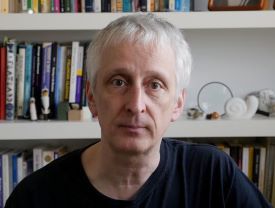Second MST Graduate Student Cafe Friday April 23
Published: 2021-04-20

One of the MST Directors, Marko Zivkovic, has taken over as the new Program Coordinator for the Science, Technology and Society Program (STS) in the Media and Technology Studies STS is the place where science and technology are examined with the tools of philosophy, history, sociology, anthropology and cultural studies. It equips students to understand where science and technology come from, how they changed over time, how they are embedded in society, and how they in turn affect it. In STS students inspect what scientists do, and how this sometimes differs from they say they do. They pay attention to how science and technology promote themselves and how society accepts or rejects them. As the current pandemic has amply shown already, whether the public at large trusts or mistrusts science can have grave consequences. Not only is STS by nature interdisciplinary, but one of its explicit missions is to examine the nature of disciplines and how they interact. With that knowledge students learn how to understand a variety of disciplines so that they can cross their boundaries and build bridges among them.
STS at U of Alberta is already 26 years old and has particular strengths in History, Philosophy and Anthropology of Science. Compared to similar programs elsewhere, the University of Alberta STS program is, to an unusual degree, drawing on art and design, literature, film and media studies, as well as research-creation, thus bringing together not only the mainstay disciplines comprising STS, but the full complement of humanities to bear on science and technology. STS recently also became a beneficiary of the rich overlap and collaboration among the newly established Faculty of Arts Signature Areas, especially with Mediating Science and Technology with which it shares core aims and constituencies.
Marko is formally trained in clinical psychology (Belgrade University) and social-cultural anthropology (The University of Chicago). He was lead to philosophy and sociology of science by his recent research into the dialogue between art and neuroscience and their illuminating failures. His long-standing interest in Japan and China inclines him to bring a larger East-West comparative perspective to the studies of science and technology. These switches from West to East, psychology to anthropology, his native Yugoslavia to USA to Canada (with a year in Japan in-between), and between art and science have created in him a predilection for jumping among worlds and perspectives. What he brings to STS is a particular sensitivity to disciplines and interdisciplinarity. He is, however, wary of taking the interdisciplinarity talk facilely; rather, he is intensely interested in the resilience and relevance of established disciplines and the very real difficulties in their mutual relationships. He sees both anthropology and STS as training in the acrobatic skill in jumping among different worlds, be it actual cultures, epistemic communities, or fields of expertise – the kind of training that produces experts in misunderstanding. He is currently working on a book about the “elastic rigour,” or “modalities of flexible inquiry across arts and sciences.”
For more about the STS program, visit https://www.ualberta.ca/media-technology-studies/programs/science-technology-and-society/index.html